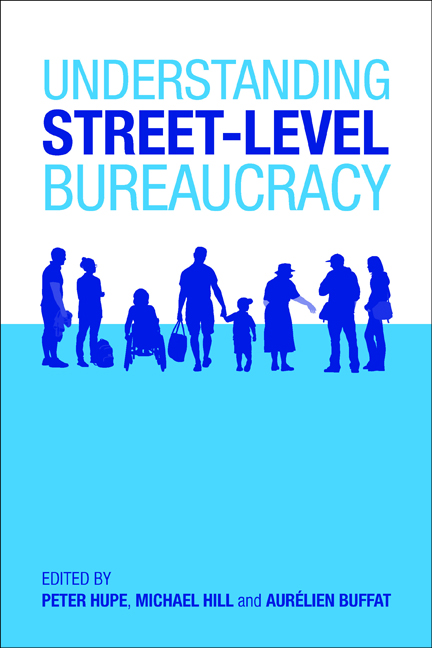Book contents
- Frontmatter
- Contents
- Biographical notes
- Preface
- Part One Introduction
- Part Two Delivering services and benefits: street-level bureaucracy and the welfare state
- Part Three Agents of the state: street-level bureaucracy and law enforcement
- Part Four Embedded in society: street-level bureaucrats as public actors
- Part Five The management of street-level bureaucrats
- Part Six The promise of professionalism
- Part Seven Conclusion
- References
- Index
Fifteen - Fulfilling the promise of professionalism in street-level practice
Published online by Cambridge University Press: 08 March 2022
- Frontmatter
- Contents
- Biographical notes
- Preface
- Part One Introduction
- Part Two Delivering services and benefits: street-level bureaucracy and the welfare state
- Part Three Agents of the state: street-level bureaucracy and law enforcement
- Part Four Embedded in society: street-level bureaucrats as public actors
- Part Five The management of street-level bureaucrats
- Part Six The promise of professionalism
- Part Seven Conclusion
- References
- Index
Summary
Introduction
As was argued in Chapter One, street-level bureaucrats work in roles with bureaucratic and professional characteristics. In an era of complex social problems, professionalism may be seen by street-level bureaucrats, policymakers and public managers as a foundation for delivering public policy that looks more promising than bureaucratic control, which may therefore result in reconsidering the mix of professional and bureaucratic work characteristics. Professionalism as an occupational value (Evetts, 2009) favours street-level decisions based on the acknowledged occupational standards, craftsmanship and ethics of workers (Abbott, 1988; Freidson, 2001). Enactment of professionalism requires ‘discretion-as-granted’ for workers to be able to make their own judgements, as well as sufficient trust in their capacities to do so (Clarke and Newman, 1997; Hasenfeld, 1999; Freidson, 2001). Professionalism holds the promise of dealing effectively with wicked social problems and offering tailor-made public services. As was discussed in Chapter One, professionalism may offer a suitable reference for the horizontal, intercollegial accountability of street-level bureaucrats’ behaviour, in addition to or as a replacement for traditional vertical modes of accountability.
Surprisingly, this potential promise of professionalism for public policy production has received modest attention among street-level bureaucracy researchers, on the one hand, and researchers of professionals, on the other (Evans, 2010). Lipsky (2010), of course, did observe that most street-level bureaucrats consider themselves to be professionals. However, he did not elaborate on how professionalism actually affects street-level decision-making. The sociology of professions has produced a large body of literature on contemporary professionalism in various fields (Evetts, 2003; Noordegraaf, 2011). However, in so far as these studies look at public professionals, they mainly focus on their professional roles in changing contexts, and less on their bureaucratic roles and impact on public policy production.
This relative lack of attention can be considered to be somewhat problematic as, for various reasons, the fulfilment of the promise of professionalism by street-level bureaucrats is far from self-evident. First of all, many street-level bureaucrats can be considered to be organisational professionals (Evetts, 2009), working in public agencies responsible for delivering public policies. Therefore, workers have to deal with standards for doing their work that originate in various sources: public policy, their organisation and their occupation.
- Type
- Chapter
- Information
- Understanding Street-Level Bureaucracy , pp. 263 - 278Publisher: Bristol University PressPrint publication year: 2015
- 1
- Cited by



